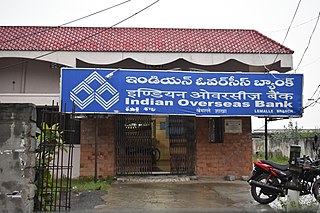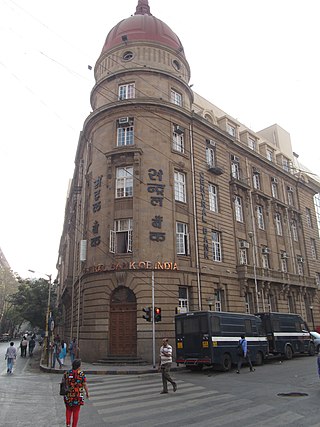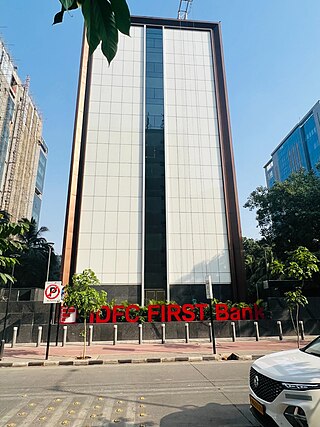
State Bank of India (SBI) is an Indian multinational public sector bank and financial services statutory body headquartered in Mumbai, Maharashtra. SBI is the 47th largest bank in the world by total assets and ranked 221st in the Fortune Global 500 list of the world's biggest corporations of 2020, being the only Indian bank on the list. It is a public sector bank and the largest bank in India with a 23% market share by assets and a 25% share of the total loan and deposits market. It is also the tenth largest employer in India with nearly 250,000 employees. In 2023, the company’s seat in Forbes Global 2000 was 77.

Bank of Baroda is an Indian government Public sector bank headquartered in Vadodara, Gujarat. It is the second largest public sector bank in India after State Bank of India. Based on 2023 data, it is ranked 586 on the Forbes Global 2000 list.

Indian Bank is an Indian public sector bank, established in 1907 and headquartered in Chennai. It serves over 100 million customers with 40,187 employees, 5,847 branches with 4,937 ATMs and Cash deposit machines. Total business of the bank has touched ₹1,221,773 crore (US$150 billion) as of March 31, 2024.

Indian Overseas Bank (IOB) is an Indian public sector bank based in Chennai. During the nationalisation, IOB was one of the 14 major banks taken over by the government of India. On 5 December 2021, IOB got Degidhan Award 2020–21 by Ministry of Electronics and Information Technology for achieving second highest percentage of digital payment transaction among public sector banks.

Modern banking in India originated in the mid of 18th century. Among the first banks were the Bank of Hindustan, which was established in 1770 and liquidated in 1829–32; and the General Bank of India, established in 1786 but failed in 1791.

The Central Bank of India (CBI) is an Indian public sector bank based in Mumbai. Despite its name, it is not the central bank of India. The Indian central bank is the Reserve Bank of India.

United Bank of India (UBI) was an Indian nationalized bank which provided financial and banking services. Established in 1950 and headquartered in Kolkata, the bank was nationalised by the government of India in 1969 becoming one of public sector banks in the country. The bank has been amalgamated with Punjab National Bank, along with Oriental Bank of Commerce, with effective from 1 April 2020.
Canara Bank is an Indian public sector bank based in Bangalore, India. Established in 1906 at Mangalore by Ammembal Subba Rao Pai. The bank was nationalized in 1969. Canara Bank also has offices in London, Dubai and New York.

Allahabad Bank was an Indian nationalised bank with its headquarters in Kolkata, India. Founded in Allahabad in 1865 and nationalized by the government of India in 1969, the bank provided banking and financial services for 155 years until it was merged with Indian Bank in 2020. It was the oldest still running joint stock bank in India until its merger.
The IDBI Bank Limited is a Scheduled Commercial Bank under the ownership of Life Insurance Corporation of India (LIC) and Government of India. It was established by Government of India as a wholly owned subsidiary of Reserve Bank of India in 1964 as Industrial Development Bank of India, a Development Finance Institution, which provided financial services to industrial sector. In 2005, the institution was merged with its subsidiary commercial division, IDBI Bank, and was categorised as "Other Development Finance Institution" category. Later in March 2019, Government of India asked LIC to infuse capital in the bank due to high NPA and capital adequacy issues and also asked LIC to manage the bank to meet the regulatory norms. Consequent upon LIC acquiring 51% of the total paid-up equity share capital, the bank was categorised as a 'Private Sector Bank' for regulatory purposes by Reserve Bank of India with effect from January 21, 2019. IDBI was put under Prompt Corrective Action of the Reserve Bank of India and on 10 March 2021 IDBI came out of the same. At present direct and indirect shareholding of Government of India in IDBI Bank is approximately 95%, which Government of India (GoI) vide its communication F.No. 8/2/2019-BO-II dated December 17, 2019, has clarified and directed all Central/State Government departments to consider IDBI Bank for allocation of Government Business. Many national institutes find their roots in IDBI like SIDBI, EXIM, National Stock Exchange of India, SEBI, National Securities Depository Limited. Presently, IDBI Bank is one of the largest Commercial Banks in India.

Vijaya Bank was a PSU bank which was merged with Bank of Baroda on 1 April 2019 with its head office in Bangalore, Karnataka, India. It was one of the nationalised banks in India. The bank offered a wide range of financial products and services to customers through its various delivery channels. As of March 2017, the bank had a network of 2031 branches throughout the country and over 4,000 customer touch points including 2001 ATMs.
The state of Karnataka, particularly the coastal districts of Dakshina Kannada and Udupi, historically and collectively known as South Canara, is called the cradle of banking in India. This is because seven of the country's leading banks, Canara Bank, Syndicate Bank, Corporation Bank, Vijaya Bank, Karnataka Bank, Vysya Bank and the State Bank of Mysore originated from this state. The first five in the above list of banks were established in the districts of Udupi and Dakshina Kannada. These districts have one among the best distribution of banks in India - a branch for every 500 persons. Between 1880 and 1935, 22 banks were established in coastal Karnataka, nine of them in the city of Mangalore.

Regional Rural Banks (RRBs) are government owned scheduled commercial banks of India that operate at regional level in different states of India. These banks are under the ownership of Ministry of Finance, Government of India, Sponsered Bank and concerned State Government in the ratio of 50:35:15 respectively. They were created to serve rural areas with basic banking and financial services. However, RRBs also have urban branches.
Public Sector Undertakings (Banks) are a major type of government-owned banks in India, where a majority stake (i.e., more than 50%) is held by the Ministry of Finance (India) of the Government of India or State Ministry of Finance of various State Governments of India. The shares of these government-owned-banks are listed on stock exchanges. Their main objective is social welfare.
Lakshmi Vilas Bank was an Indian private sector bank established in 1926 in Karur, Tamil Nadu. As of November 2020, the bank had 566 branches in 19 states and 1 union territory. On 27 November 2020, the bank was merged into the Indian subsidiary of DBS Bank.
Kaveri Grameena Bank was a Regional Rural Bank established under Regional Rural Banks' Act 1976, was a Scheduled Bank jointly owned by Government of India, State Bank of India and Government of Karnataka, permitted to carry all kinds of banking business. The Bank was operating in 22 Districts of South Karnataka, having its Head Office at Bellary City with Nine Regional Offices at Mysuru, Mandya, Bengaluru, Tumakuru, Hassan, Chamarajanagar, Madikeri, Chikmagulur and Ramanagara etc.
Paytm Payments Bank (PPBL) is an Indian payments bank, founded in 2017 and headquartered in Noida. In the same year, it received the license to run a payments bank from the Reserve Bank of India and was launched in November 2017. In 2021, the bank received a scheduled bank status from the RBI.
Pranlal Devkaran Nanjee was a noted Indian banker, businessman and philanthropist from Bombay, India.
Ujjivan Small Finance Bank Limited is an Indian small finance bank based in Bangalore, which commenced operations on 1 February 2017. Ujjivan Financial Services holds an 80 percent stake in the bank.

IDFC FIRST Bank is an Indian private sector bank formed by the merger of the banking arm of Infrastructure Development Finance Company and Capital First, an Indian non-bank financial institution.










